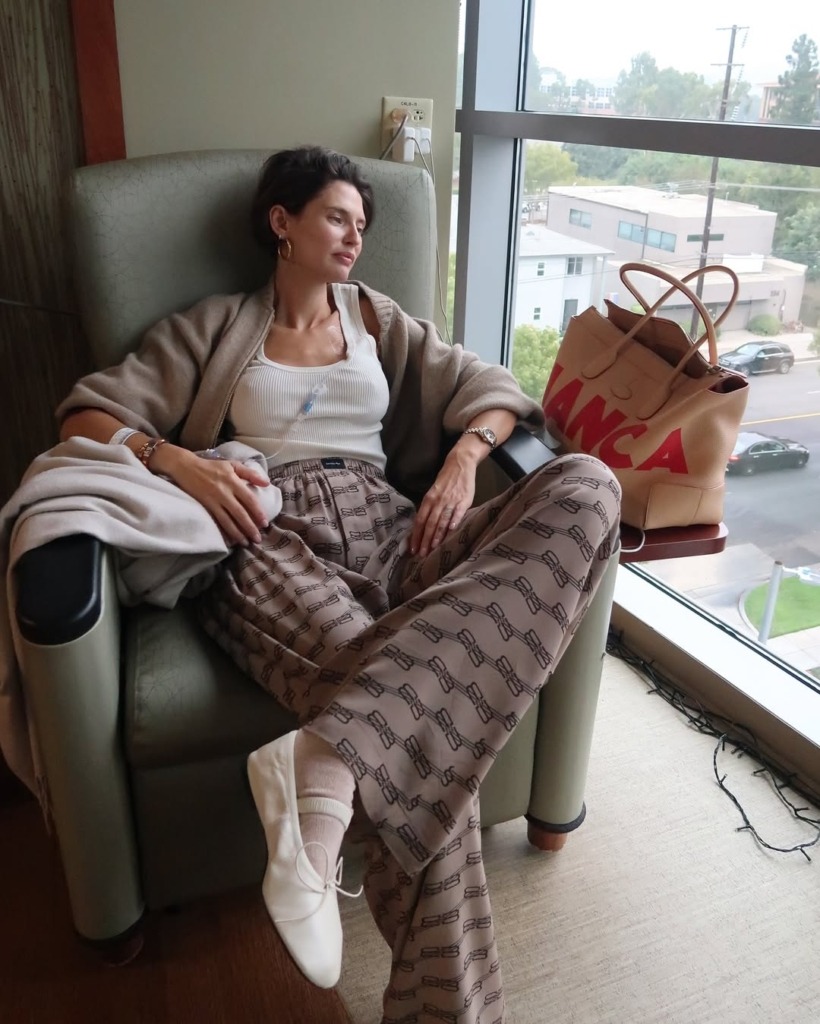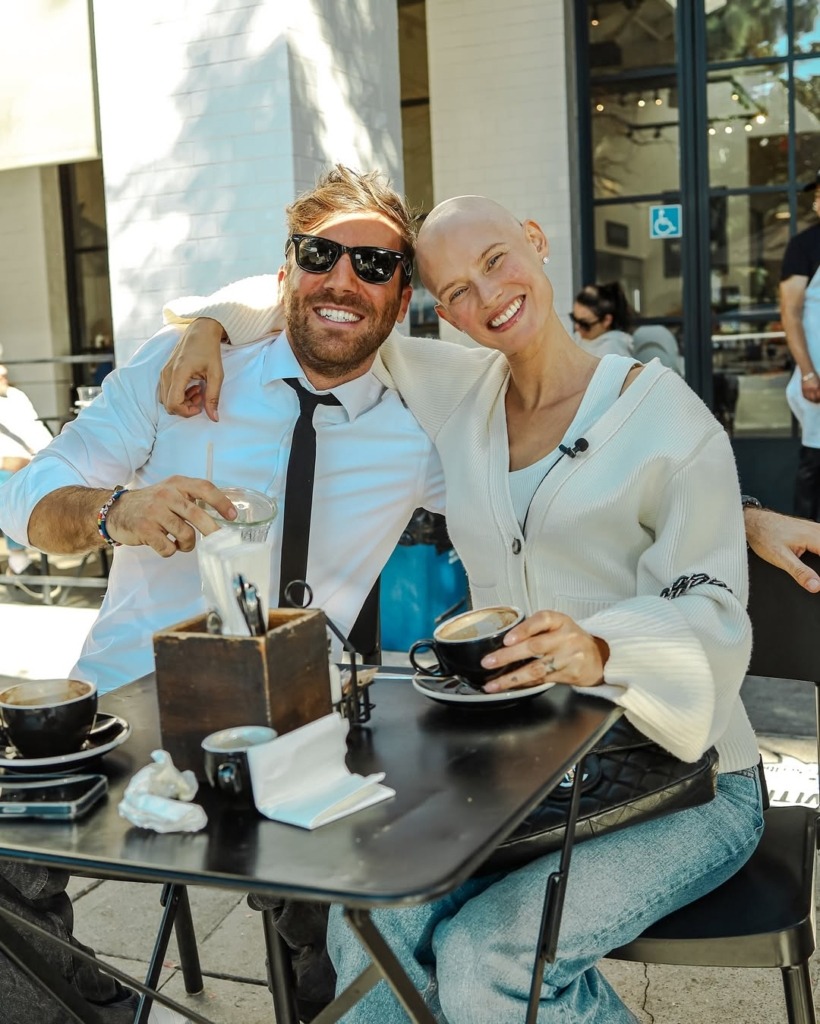How Bianca Balti inspired us by sharing her personal struggle on social media
Tina KovačićekMay 19, 2025


May 19, 2025
A little over six months ago, Bianca Balti openly shared with the world a diagnosis no one wants to hear in their lifetime. A diagnosis we always imagine happens somewhere far away, hoping we will never have to face it ourselves. But for Bianca, being diagnosed with stage three ovarian cancer was a reality, along with the sentence she used to introduce us to her private battle: “I will win!” — accompanied by photos of her smiling, surrounded by her children — daughters Matilda (17) and Mia (9).
For years, we remembered her as the iconic face of Dolce & Gabbana campaigns, but now Bianca invited her followers to witness her visual journey of healing, raw and unfiltered. Postcards from a supermodel’s life were replaced by the scar after surgery, hair loss, chemotherapy process, hair regrowth — all there as proof of real life, always with Bianca’s big smile that never left her face despite the hardship. Some might think one should retreat after such news, but Bianca chose to share her fight publicly on social media. She normalized her pain to a level where she could and wanted to talk about it openly while drawing strength from that openness and offering it to others. Becoming an example of how to face life’s hardest moments, Bianca sends a powerful message. But it raises the question — is there even a right way to react to difficult life situations? We discussed this with two experts.
How do we cope with illness and a diagnosis no one wants to hear? Is it better to keep it secret or to share it, even with strangers on social media, just like Bianca Balti did? There is no universal answer, no right or wrong — we agree on that. “People are different, and just as there are many people, there are many ways in which they react when they receive news about their illness. There is no right or wrong, only a reaction to the news we received at that moment,” says Ivana Peršin, psychotherapist and gestalt therapy practitioner. In Bianca Balti’s case, honesty and openness were the best paths to healing. Bianca’s brave posts and messages about strength and hope may seem too intimate for the public social media scene to some. Still, it is precisely this transparency that opens a new dimension — it offers hope and reminds us how important it is to be honest and support each other through life’s storms.

@biancabalti
A long journey awaits me, but I know I will overcome it. For me, for my loved ones (my daughters are at the top of the list), and for all of you who need strength—you can borrow some from me, because I have enough for everyone. Life happens, and cancer has so far given me the chance to find beauty through the obstacles life puts in your way, is one of the sincere and encouraging messages Bianca shared on social media. Through her actions, Bianca revealed an additional dimension of herself and her undefeated optimism, which culminated in her appearance as co-host at this year’s Sanremo Festival in February. Without hair, impeccably dressed, Bianca proudly stood on stage as the embodiment of courage and determination to win—still magnificently beautiful (this time, I would say most of her beauty came from within and from the genuine, unbreakable smile she wore). However, such optimism is not always present in everyone facing illness or other difficult moments in life.
“Forcing optimism and advice like ‘Just think positive’ can actually be harmful because they lead to suppressing all the unpleasant feelings that naturally arise in such situations. Pushing difficult and painful emotions under the carpet can cause stress, exhaustion, and even depression,” explains Petra Mehmedović, gestalt therapist. It’s also important to emphasize “that staying strong or not should be left to the person’s own choice, to feel what they need,” says Ivana, adding that “a negative diagnosis will inevitably affect the person’s life in many ways through different phases,” and we agree that it will also impact those around them. Ivana and Petra go on to advise how one can react in these situations without being overwhelmed by discomfort and what strategies can help face difficult times.
Do you have to find optimism right away, or is it okay to spend some time in sadness and shock?
“You don’t have to! At the start, nothing is mandatory—not even optimism as a reaction to receiving news of an illness. All feelings a person experiences are valid because they reflect how we perceive the experience we are going through. The reaction also depends on the type of illness and its prognosis. So, many factors influence how someone reacts to the diagnosis. Sadness is part of the process people with illness go through; in a way, they mourn what has been lost or what might be lost. This can be as simple as mourning the loss of health and vitality, or, in cases of incurable disease, mourning the potential loss of life and the separation from everything they’ve known. What’s certain is that one loss often leads to many others. Mourning helps us grieve what we lose or have lost and brings us closer to accepting the experience we are living through,” Ivana explains. Petra adds that in such situations, “it’s important to give yourself time to accept the diagnosis and seek support from close ones, someone who has gone through something similar, or even a professional, to help cope more easily with the feelings that arise.”

@biancabalti
How much can fear, sadness, and uncertainty hold us back from optimism and, ultimately, a positive outcome of the whole situation?
“Optimism (the genuine kind, not forced) can be very important in fighting illness because it has positive psychological and physiological effects. It reduces stress and anxiety, increases motivation, and has positive effects on the immune system, making it definitely a crucial part of treatment. However, it’s important not to overdo it or push yourself to be optimistic at all costs. It’s perfectly okay to have moments when we’re not optimistic and when we feel a lot of fear, sadness, or anger. Optimism and difficult emotions are not enemies. We don’t need to run away from them because it’s possible to be both scared and aware of the seriousness of the situation while at the same time nurturing optimism and hope for a good outcome,” Petra tells us, while Ivana adds that “optimism can coexist with sadness and fear; one doesn’t exclude the other, but can complement it if that’s how the person feels.”
Which personal resources do we need to activate in order to become strong in coping with a diagnosis?
“Using our own resources means listening to ourselves and our needs, acknowledging and accepting our feelings. It also means being gentle, kind, and patient with ourselves, because the person who is ill needs themselves the most. In those moments, nothing may seem to make sense, and a person will search for new meaning in a situation that is sudden and requires major changes and adjustments,” Ivana tells us, emphasizing that self-care is key, which also includes accepting support that is important during the process of going through the experience. “Ultimately, we are all responsible for our own lives and have the right to choose how we want to live it, even in illness,” Ivana concludes.
How important is the support of others?
“Support from others is an important factor in the process of healing and rehabilitation. The first level of support comes from family, friends, and other close people with whom the person has a connection. The second level of support comes from professionals with specific knowledge, such as doctors, psychotherapists, nutritionists, and others. What people going through illness need most is to be heard, respected in their illness, and accepted. The changes a person experiences will affect their life, so it is important that they give themselves permission to receive external support. Support and a safe environment from loved ones and professionals who guide us through the stages of illness can provide the feeling that we are not alone. Finally, the message for those who want to offer support is to simply be there, listen (much more than talk), and respect the path and way the person in need has chosen for themselves,” Ivana tells us.